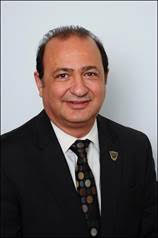 What inspired you to enter city management and what was your path for becoming a City Manager?
What inspired you to enter city management and what was your path for becoming a City Manager?
My public service career started at the L.A. City Building Department after graduating from college in the mid-1980s as the economy was just turning around. I found myself very interested in helping community members achieve their goals while still adhering to strict construction standards. That approach carried over as I moved from a very large department to the City of Beverly Hills.
While serving for several years as the City’s Community Development Director, I was fortunate to work closely with the City Manager, the Council and several commissions. I became very familiar with the community and the important issues they care about. As I moved up the ranks in the organization, I became much more aware of the level of involvement local government has in the daily lives of the citizens. I believe it is very special and rewarding to have the opportunity to contribute to society as a public servant who is truly committed to improving the community he or she serves.
I was encouraged by my City Manager to explore opportunities for growth, even if it meant leaving my comfort zone and the City. I served as a Deputy City Manager in Rancho Cucamonga for two-and-a-half years, where I was exposed to many capital and infrastructure investment projects in a rapidly growing city. Running an organization that is committed to delivering the highest level of service and building on accomplishments that contribute to the city’s future is what inspired me to continue to learn and be patient for my current role. The experience as a Deputy City Manager especially helped me hone my skills in budgeting and project management, which prepared me for coming back to Beverly Hills as the Assistant City Manager.
I served in that capacity with former City Manager Jeff Kolin for close to six years. When he decided to retire, I felt I was ready to assume the leadership of the organization. I served in an interim capacity for close to nine months and, in October of 2015, I was appointed by the City Council as the City Manager. I have spent almost my entire career in Beverly Hills, working hand-in-hand with my fellow employees to provide the community with the high level of customer service that is very much expected in smaller cities.
What role does a City Manager play in local government and how do you feel it differs from that of a Council Member or Mayor?
The Manager’s primary role is to help the City Council develop policy and legislation and set operational priorities. Then, the manager needs to develop a strategy (both short- and long-term) for coordinating budget and resources to accomplish the Council’s goals and objectives. Mayors and Councilmembers set the vision for the community and the city’s future while representing their constituencies’ interests. Community interests may or may not align with each other and the Manager’s responsibility is to look for commonalities, offer professional advice, and provide options to help the decision-making process.
What city project are you most proud of?
We just recently completed a community dog park that was in the discussion process for close to eight years. It is turning out to be a great success and, so far, we have registered over 500 dogs and their guardians. The other project that I am quite proud of is a joint public-private partnership that resulted in the development of a five-star hotel, a parking garage with over 1,000 spaces, and a public garden/open space in the middle of the Business District. I was the Community Development Director when the project was being processed for entitlement and was intimately involved in coordination and presentations during the public hearings. There was tremendous concern over the scale of the project and whether the City was on the “losing end” of the partnership. The project has turned into a great success and is considered a tremendous community asset, even by those who were adamantly opposed to the project at the time.
What do you feel are the greatest challenges facing City Managers in the state today?
I believe there are several large challenges facing City managers today:
- The fiscal impact of the pensions and other post-employment benefits.
- The public trust and the perception of lack of governmental transparency are issues that we have to work hard to overcome.
- As many of the leaders in government approach retirement age, succession planning becomes a growing concern.
What is the role of a City Manager in upholding the public’s trust in local government?
The city manager’s role is to instill a culture of ethics and community service in the organization. Providing a consistent, high level of service with a sense of transparency builds public trust and creates an environment where the community knows that the organization is empathic, reliable and ready to deliver.
How are cities shaping the future of California?
Cities are the closest form of government to the citizens. Working closely with elected officials and their constituents to build an environment that is safe, healthy and resilient is what every community looks for in shaping their future. Maintaining the City’s fiscal health is the key to providing services that impact citizens’ daily lives the most. City leaders also need to tap into the civic interest of the Millennial generation and engage them in policy development so they are closely involved in building the future of cities for generations to come.
